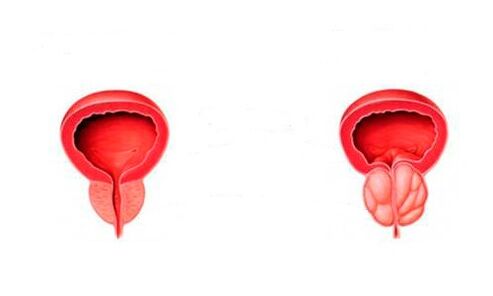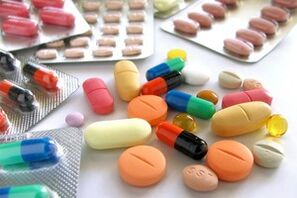Today, drugs for the treatment of prostatitis are the last in the range of drugs offered. And not in vain: among the pathologies of the male reproductive system, prostate disease is the most common.

Prostatitis is an inflammatory process of the prostate gland.
Inflammation of this organ often manifests itself:
- discomfort in the reproductive organs during or outside urination;
- pain during ejaculation (ejaculation);
- discomfort in the pelvic region and external genitalia.
All this leads to a decrease in activity and general well-being, emotional instability and psychological disorders. If you suffer from these symptoms, you should contact a specialist immediately.
An experienced urologist will perform the necessary diagnostic methods and help to cope with the disease.
It should be noted that the healing process may take some time, but it is easier to cope with the small functions of this organ than to start an irreversible process that leads to the development of fatal consequences, including prostate cancer.
General provisions of therapy

As mentioned above, prostatitis is an inflammatory process and, like any inflammation, is caused by most bacteria, so it is not surprising that medications for prostatitis are mostly antibacterial agents (antibiotics).
The next step in the fight against the disease is non-steroidal anti-inflammatory drugs. By affecting the microcirculation in this organ, they have a positive effect by reducing edema in the prostate gland. The goal of this treatment is to reduce venous congestion in the small pelvis.
Another important factor in the management of a patient with diseases of the reproductive system is the reduction of pain syndrome. In most cases (especially in chronic or complex forms of the disease) the main complaint is pain, so the doctor should help the patient to cope with extremely unpleasant sensations in the external genital area.
The final step is to prevent the development of future treatment complications and relapses.

Here it is advisable to set recommendations for the correction of immunity, vitamin therapy, and general improvement of health:
- a low-fat diet;
- moderate physical activity;
- stay in the fresh air;
- to follow the rules of personal hygiene;
- giving up bad habits (smoking, alcohol);
- scheduled medical examination every six months.
By following these simple rules, you can not only prevent complications, but also prolong your sexual activity.
The first step: pest control
Experts conventionally divide antibacterial drugs for prostatitis into three main groups: fluoroquinolones, tetracyclines and macrolides, to a lesser extent - cephalosporins.
Fluoroquinolones are considered to be the most effective in the treatment of these organ diseases due to their many properties:
- affects most types of microorganisms that cause disorders of the genitourinary system;
- accumulates in the glandular tissues, which has a maximum effect on bacteria;
- practically does not cause immune deficiency after a course of therapy;
- does not cause resistance (resistance of microbes to the effects of antibacterial drugs of this class).
Other prominent members of the group of antimicrobials for inflammation of this organ are tetracyclines and macrolides.
Long before the development of their improved counterparts fluoroquinolones, these drugs helped to overcome the dysfunction of the prostate gland of a bacterial nature. However, over time, microorganisms have become more resistant to these two groups of drugs. In addition, these groups of drugs have a very long list of side effects and contraindications.
It should be noted that any antibacterial drug can have a spermatotoxic effect, which should be notified to the patient in advance. The use of antibiotics at least four months before conception (full cycle of spermatogenesis) is undesirable.
Step Two: Reduce swelling
Prostate disease drugs, which have a positive effect on microcirculation, have shown themselves well in modern treatment regimens for prostate diseases. Helps to fully supply the body's tissues with drugs through the bloodstream, improves the excretion of secretions from the body's channels, increases metabolic processes in the cells, which in general helps the body fight inflammation.
Non-steroidal anti-inflammatory drugs (NSAIDs) differ from this group of drugs. Two types of drugs are often used in this series:
- rectal suppositories - the effect manifests itself relatively quickly due to the local effect of the drug, which reduces the frequency and duration of administration;
- the drops are drawn in. The course lasts twice as long as the use of rectal suppositories. It is prescribed 15 drops 4 times a day before meals.
To help the patient
The main direction of action for the treatment of prostatitis is not specific to immunocorrection and analgesics. However, they can still alleviate the patient's fate and reduce the risk of re-inflammation.
To reduce the pain, your doctor may prescribe painkillers orally (orally) or rectally (suppositories and microclysters). At the same time, taking the pill has a relatively short-term effect, but it is more convenient to use.
Special therapy
Recently, more and more effective drugs are being prescribed for prostatitis, which has a narrow range of action in the body. All of them combine and move in the glandular tissues, in parallel, have a beneficial effect on organ cells, increase metabolism and the restoration of function.
Combination medications are convenient to use, but also keep in mind the generally accepted treatment regimen for prostatitis. It is better to consult a specialist to take this medication.
Hormone therapy for prostatitis
More often, male sex hormones are prescribed as a general regimen for the treatment of prostatitis. However, it is important to remember that they should be taken very carefully and make sure they are necessary for the patient before prescribing.
Patients suffering from this disease have long seen a decline in the quality of their sexual lives. Among other things, such patients experience depression and apathy against the background of sexual inferiority. Hormone therapy will help to cope with sexual dysfunction and improve a person's general condition.
Whatever medication your urologist recommends for your recovery, remember that the key to treating any illness is to strictly follow your doctor's instructions and prescriptions, to make an early diagnosis, and to take care of your health.
And regardless of the likelihood of recurrence, do not neglect prevention. Prevention is better than cure.
































